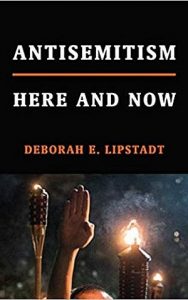INTERVIEW WITH AUTHOR DEBORAH LIPSTADT
Author and educator Deborah Lipstadt counts among the contemporary public intellectuals I most admire.
She is widely-known for her victory in a libel suit filed by Holocaust denier David Irving. Her superb book about that experience, HISTORY ON TRIAL: MY DAY IN COURT WITH A HOLOCAUST DENIER is the basis for the film DENIAL in which Rachel Weisz plays Deborah.
Lipstadt’s other books, though, are equally compelling. I very highly recommend her most recent effort, ANTISEMITISM: HERE AND NOW, as it provides urgently-needed food-for-thought regarding increased antisemitism in our contemporary world. As I’ve said, in publishing this book, Deborah Lipstadt has done an enormous public service. After reading ANTISEMITISM: HERE AND NOW, I asked Deborah to answer a few questions, and she graciously responded for the following interview.
1)
What was your first direct personal experience of antisemitism, and how did you react to it?
I have had relatively few encounters with antisemitism.
The most direct was actually with philosemitism. Fresh out of graduate school, I was appointed Assistant Professor of Modern Jewish History in the History Department of the University of Washington.
This was the first time any position in that university had the word Jewish in its job description. Things went terrifically well. Classes were full. Relations with colleagues were excellent. All was great. Towards the end of the year, a colleague invited me out for coffee and said: “When I saw that the person selected for this job was a woman . . . a New Yorker . . . a Jew . . . I was really worried. What were we getting ourselves into here? BUT you have been terrific. You are the best thing to happen to this department in ages.”
I knew he thought I should be pleased at these accolades. But they were embedded in pure antisemitic tropes.
2)
I know many individual present-day Germans who are vigilant against antisemitism. Yet it seems the German government isn’t as vigilant as it might be. The German government, for example, was in a rush to do business with the Iranian government, though the Iranian government sponsors cartoon contests mocking Holocaust victims. The German government also all too often fails to hold certain antisemitic persons accountable for violating the country’s laws against hate speech. And recently, it took the intervention of the U.S. Ambassador with the German government to prevent a terrorist who had murdered Jews from entering Germany and then speaking at an anti-Jewish event in Berlin. What are your thoughts on this?
Actually. I think that by and large the German government has been pretty good on these issues. I do think that there is a failure to recognize that many of the acts of antisemitism come from the Muslim community. Often, they are not violent or violent enough to grab a headline but there is deep seated antisemitism in the mosques and within certain segments of the Muslim community. I am not sure that the government or police are willing to acknowledge this sufficiently.
3)
In the U.S., there is antisemitism on the political far right as well as on the far left. We all too often see Democrats and Republicans pointing fingers at each other while failing to deal with the antisemitism on their own side. How do you think we can encourage the society to make a nonpartisan commitment to reducing antisemitism?
STOP WEAPONIZING ANTISEMITISM. Stop declaring that one party is antisemitic. Recognize that antisemitism exists on both sides of the political transom. Don’t just see it on the “other” side.
(Ed. – In a March 16, 2019 interview with Matt Lebovic for The Times of Israel, Deborah Lipstadt urges people concerned about antisemitism to remain calm:
““It’s easy to be shrill, it’s easy to panic,” said Lipstadt. “It’s natural to yell and scream. But that’s not what I aimed to do. I aimed to educate, to make people aware, to get them to think… and speaking softly is a better way of doing that, I believe.”)
4)
What do you think can be done better to heal Jewish people who harbor internalized antisemitism? In this context, I’ll provide one example of what in my view demonstrates internalized antisemitism, as least to some degree. On the first day of Hanukkah in December, 2018, the New York Times published an op-ed by a Jewish writer titled “The Hypocrisy of Hanukkah.” To me it would seem out of the question for the Times to publish “The Hypocrisy of Christmas” on December 25 or “The Hypocrisy of Ramadan” on the first day of Ramadan, so what does it say that the editors were comfortable publishing this particular Hanukkah op-ed?
It probably was a Jewish editor who did not think there was anything wrong with it.
5)
What have been some of the most personally satisfying aspects of your career to date?
There are too many to enumerate. I am eternally grateful for the support I received during my trial. My research and scholarship have been supported by the universities at which I teach. But the best thing is when someone comes up to me at a lecture and says “You won’t remember me but you had a tremendous impact on my life.”
What could be better than that?
**********
Deborah Lipstadt’s ANTISEMITISM: HERE AND NOW is available here on Amazon and here from Barnes and Noble.
**********
